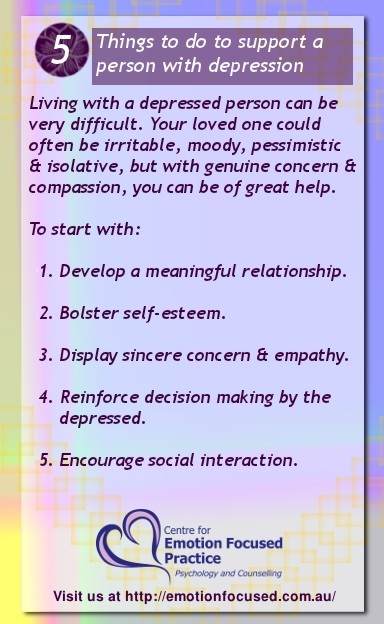Top 5 Things to Do to Support a Family Member with Depression
 Is there anyone in your family who is feeling anxious or stressed? Is that person saying that everything is too much for him or her? Can you observe that feeling of helplessness, hopelessness or frustration? If your answer is all yes, then note, that person may be depressed.
Is there anyone in your family who is feeling anxious or stressed? Is that person saying that everything is too much for him or her? Can you observe that feeling of helplessness, hopelessness or frustration? If your answer is all yes, then note, that person may be depressed.
What is Depression?
Depression is a state of feeling low and repugnance to activities of daily living. This poses a major concern if the person does not acquire the necessary coping mechanisms to deal with the situation and if these symptoms persist for over two weeks.
Watch a video of Dr. Melissa Harte answering questions about depression.
Criteria for Major Depressive Disorder
According to the American Psychiatric Association DSM IV (Diagnostic and statistical manual of mental disorders IV), Major Depressive Disorder (MDD) can be diagnosed if in a minimum of two weeks period, five of the nine criteria that always involves a depressive mood or anhedonia are recurrently happening. The criteria are:
- Depressed mood
- Anhedonia – the inability to experience pleasure
- Significant change in weight
- Insomnia or hypersomnia
- Increased or decreased psychomotor activity
- Fatigue or energy loss
- Feelings of worthlessness or guilt
- Diminished concentration or indecisiveness
- Recurrent death or suicidal thoughts
MDD is quite a problem and approaching a psychologist may be necessary, but it must be noted that it is not the sole instrument of help. Truly, living with a depressed person can be very difficult. The person is often irritable, moody, pessimistic and isolative, but with genuine concern and compassion, you too can be of great help to the wellness of your loved-one.
Here are the top 5 things to do to help a family member with depression:
1. Develop a meaningful relationship.
Make the depressed feel that he or she is valued as a person. Pay attention whenever the person talks, no matter how irrelevant the story is to you. Do not judge or make vague comments. Allow expression of self whenever he or she wants it, but if peacefulness and being alone are demanded, stay with the person anyway, but be silent. One of the most effective therapeutic communication techniques is silence. You do not really leave, but give a space for that person to think – because, in time, he or she will open up to you and end up sharing inhibitions, frustrations and fear without you asking.
2. Bolster self-esteem.
Depressed people suffer from low self-esteem. The most effective approach to make them have that sense of personal worth is to accept them as they are – negative attitude and all. Assist your loved one to focus on positive things like accomplishments. Provide positive feedbacks and prevent the person from embarrassments like smelly clothes, halitosis or untidy appearance. Encourage self-care. If you can lure them to go outside the house and to a spa or to a salon, then that would be better. These types of activities, especially in the case of women can make them feel lighter and happier.
3. Display sincere concern and be empathic.
Acknowledge the pain and emotional struggles of the person. Try to put yourself in your loved one’s situation and try to think what could have happened to you in those same shoes. Offer help and work through the pain. It wouldn’t be easy, as every individual has different approaches for every problem, but be patient. Go through the process of pain mediation slowly until the person accepts the things that can never be changed. Take note that it is also important that you discuss about your own feelings with other people so that you can better handle situations like this.
4. Reinforce decision-making by the depressed.
A depressed person can have difficulty in making even very simple decisions. Despite this, you still have to allow the person to come up with a personal decision, even if you are the older sibling, the aunt or parents. You may give suggestions, but never badger them into making a decision. On the other hand, it is therapeutic to provide decision making opportunities. This way, they will not blame you for whatever outcome the decision may bring.
5. Encourage social interaction.
An individual who is depressed has the tendency for social isolation. Do not tolerate this, but do not impose. Think of activities that may capture the person’s interest. Activities should most of the time be those that enable the person to experience success. Don’t provide activities that reinforce frustration or dismay. Bring the person outdoors. Take some time to accompany him or her to somewhere that he or she is comfortable in. Initiate bonding activities like going to the mall and do shopping, going to the salon, spa or movies. For males, try eating at a restaurant where he can meet other people, go sight-seeing, or do some sports or exercises. Going to clubs may also be helpful. Encourage the person to be a member of a club that does notable things like charity work or other activities that are praise-worthy.
Depression is just another problem that has a solution. But it can do its worst and lead the one you love to suicide. According to researchers, the greatest incidence of suicide happens to people who have a history of Major Depressive Disorder. It sounds morbid and by all means, we don’t want that to happen to anybody, more, to the people we love. It is therefore, very important to be on the lookout for signs of depression and do something to prevent this from happening. At home, daily conversation is very helpful. To relieve stresses and problems, simply talking is an avenue of releasing negative feelings and relieving the person from emotional burdens.
Life is full of the unexpected. We should not expect to be served with success and happiness at all times. Life can get rough. We have to remember that nothing is perfect – there will always be gloomy days. Inner strength and family support are necessary to survive those tough times.
Treating Depression at the Centre
A practitioner offering counselling and psychotherapy for depression here at the Centre for Emotion Focused Practice:
- Dr. Geoff Newbegin, Psychologist & Psychotherapist
More Resources on Depression
- Our Community Information Session this month on Tuesday, the 23rd of July, 2013, is on Depression. You can buy tickets for the one-hour workshop (6.30-7.30 PM) through our events page.
- Video: What is Depression? – Interview with Dr. Melissa Harte
- You Can’t Make Sense of Happiness if You Don’t Know Sadness
- Coping with Loss and Grief
- Depression is More Than Feeling Blue
-
[…] Top 5 Things to Do to Support a Family Member with Depression […]
Leave a Comment







Everything is very open with a precise description of
the issues. It was truly informative. Your site is very helpful.
Thanks for sharing!
That is a really good tip especially to those fresh to the blogosphere.
Simple but very precise information… Thanks for sharing this one.
A must read article!
I am not sure where you’re getting your information,
but great topic. I must spend some time finding out
much more or working out more. Thank you for excellent information I was in search of this info for my
mission.